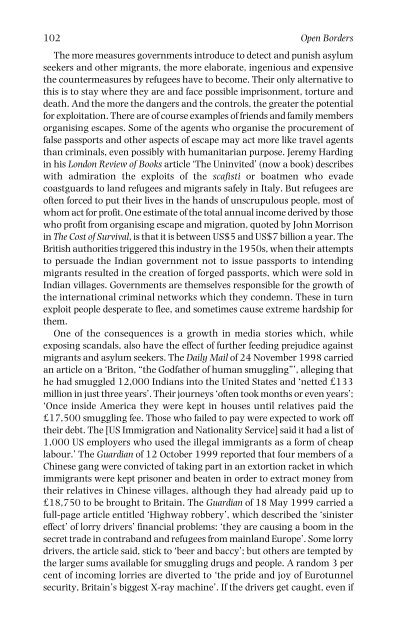Open%20borders%20The%20case%20against%20immigration%20controls%20-%20Teresa%20Hayter
Open%20borders%20The%20case%20against%20immigration%20controls%20-%20Teresa%20Hayter
Open%20borders%20The%20case%20against%20immigration%20controls%20-%20Teresa%20Hayter
You also want an ePaper? Increase the reach of your titles
YUMPU automatically turns print PDFs into web optimized ePapers that Google loves.
102 Open Borders<br />
The more measures governments introduce to detect and punish asylum<br />
seekers and other migrants, the more elaborate, ingenious and expensive<br />
the countermeasures by refugees have to become. Their only alternative to<br />
this is to stay where they are and face possible imprisonment, torture and<br />
death. And the more the dangers and the controls, the greater the potential<br />
for exploitation. There are of course examples of friends and family members<br />
organising escapes. Some of the agents who organise the procurement of<br />
false passports and other aspects of escape may act more like travel agents<br />
than criminals, even possibly with humanitarian purpose. Jeremy Harding<br />
in his London Review of Books article ‘The Uninvited’ (now a book) describes<br />
with admiration the exploits of the scafisti or boatmen who evade<br />
coastguards to land refugees and migrants safely in Italy. But refugees are<br />
often forced to put their lives in the hands of unscrupulous people, most of<br />
whom act for profit. One estimate of the total annual income derived by those<br />
who profit from organising escape and migration, quoted by John Morrison<br />
in The Cost of Survival, is that it is between US$5 and US$7 billion a year. The<br />
British authorities triggered this industry in the 1950s, when their attempts<br />
to persuade the Indian government not to issue passports to intending<br />
migrants resulted in the creation of forged passports, which were sold in<br />
Indian villages. Governments are themselves responsible for the growth of<br />
the international criminal networks which they condemn. These in turn<br />
exploit people desperate to flee, and sometimes cause extreme hardship for<br />
them.<br />
One of the consequences is a growth in media stories which, while<br />
exposing scandals, also have the effect of further feeding prejudice against<br />
migrants and asylum seekers. The Daily Mail of 24 November 1998 carried<br />
an article on a ‘Briton, “the Godfather of human smuggling”’, alleging that<br />
he had smuggled 12,000 Indians into the United States and ‘netted £133<br />
million in just three years’. Their journeys ‘often took months or even years’;<br />
‘Once inside America they were kept in houses until relatives paid the<br />
£17,500 smuggling fee. Those who failed to pay were expected to work off<br />
their debt. The [US Immigration and Nationality Service] said it had a list of<br />
1,000 US employers who used the illegal immigrants as a form of cheap<br />
labour.’ The Guardian of 12 October 1999 reported that four members of a<br />
Chinese gang were convicted of taking part in an extortion racket in which<br />
immigrants were kept prisoner and beaten in order to extract money from<br />
their relatives in Chinese villages, although they had already paid up to<br />
£18,750 to be brought to Britain. The Guardian of 18 May 1999 carried a<br />
full-page article entitled ‘Highway robbery’, which described the ‘sinister<br />
effect’ of lorry drivers’ financial problems: ‘they are causing a boom in the<br />
secret trade in contraband and refugees from mainland Europe’. Some lorry<br />
drivers, the article said, stick to ‘beer and baccy’; but others are tempted by<br />
the larger sums available for smuggling drugs and people. A random 3 per<br />
cent of incoming lorries are diverted to ‘the pride and joy of Eurotunnel<br />
security, Britain’s biggest X-ray machine’. If the drivers get caught, even if


